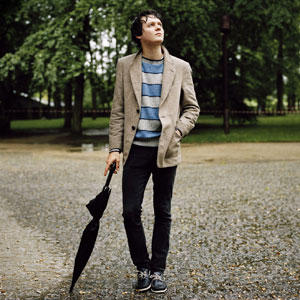As inevitable as a string of As at a level for a high achieving female candidate, arrives Beirut's latest superlative album, The Rip Tide. At nineteen, whilst many of us were still retaking our A level English exams, Zach Condon (aka Beirut) was quietly composing (in his bedroom) an album of precocious, baroque- styled Balkan indie-folk which would make him the doyen of the music press. A self proclaimed Albuquerque college dropout, he spent a meagre four months in Eastern Europe, which proved enough to imbibe the musical culture sufficiently to create the feted 2007 album Gulag Orkestar. The album drew on his travels of eastern Europe resulting in a jam packed work full of kitchy horns, strings and the bombastic pomp of youth. A string of successful EPs followed in 2007, proving Condon prolific as well as prodigious.
A lengthy hiatus followed and it seemed the wunderkid had entered adulthood with an uncharacteristic hesitancy. So four years later Beirut return, not quite reinvented but certainly retuned, to a poppier, more accessible frequency. Weighing in at nine tracks and thirty three minutes, the album is scarcely longer than the EPs we are used to, yet the streamlined approach works well. It no longer feels like Condon is the showoff sophomore, throwing every instrument into the mix simply because he can. This kitchen sink aesthetic, though wonderful when it works, can be a bit overbearing, and let's face it there is only so much brass and french horn that one can take in a single sitting. So on The Riptide, Condon has played to his strengths, namely his unquestionable melodic sensibilities, and his swooning, honey like vocals. He sticks for the large part to his beloved ukulele, the piano and (well judged) brass. However, songs such as 'Santa Fe' see him dabble in textures hitherto unexplored, with keyboard effects slowly giving way to the typical brass.
The album also has a slightly more upbeat feel (musically, at least) than previous outings. The first three songs especially provide a glorious gusto to proceedings, and this is perhaps his strongest opening to date (two of this opening trio are linked below). The first song, 'A Candle's Fire', whose accordion opening sounds bizarrely like a Lightening Seeds track, sets the scene; euphoric, hooky and still sounding like the Beirut we know and love. Similarly, 'Payne's Bay', contains all the trademark Beirut opulence yet seems somehow more laid back and contented, more joyous. A quality that had been somewhat lacking previously, barring a few notable exceptions, namely 'Postcards From Italy', yet by anyone's standards that would be exceptional.
Elsewhere, the album's title track is perhaps Beirut's best moment to date. Condon's lyrics are stripped to their bare bones, as he sings, mantra like, "this is the house where I feel alone", whilst the squeaky rhythm section resembles a door creaking. It is an elegiac yet beautiful song, and as often during the album, piano led. And the piano melody itself could be a hit, or a trance song if reconfigured.
The album has a bittersweet, autumnal feel, as if one is having great times yet sad as they know they can't go on for ever. See love song 'Upper East Harlem' (below) for evidence. The lilting, upbeat verses are usurped by a gorgeous though achingly sad horn led chorus. Condon has always spoke more eloquently through his music than his lyrics and this is tacitly acknowledged here through that wordless, understated horned reprise. It speaks more than words could ever do.
However, Beirut's lyrics are more prominent in this album and less swallowed through the elision of his vocal slurring, he is (nearly) always comprehensible. No longer sacrificing meaning entirely for sound. He sings of places, 'Upper East Harlem', 'Payne's Bay', and in 'Santa Fe', his homeland. As such this seems a more personal album. All these tracks speak in a more overtly emotional way than any previous material. After the relentless musical tourism, Condon has returned home, and to himself. As he said in a recent interview, "I feel like I'm back where I started."
This album sees Beirut find their voice, rather than swamping everything with lush orchestration Condon lets his songs speak in a way that they never have before.With more restraint and confidence in his songwriting, he no longer plays musical magpie (as much), and seems to have settled into a particular style (classic baroque pop) after the experimentation of the Zappotek/ Realpeople Holland EPs.
A strange thing to say about an artist who arrived so fully formed, but Beirut have matured, and evolved into the finished article. Wherever they go from here will be intriguing. For me, the best LP of the year so far. The college dropout has returned home with straight As.


No comments:
Post a Comment